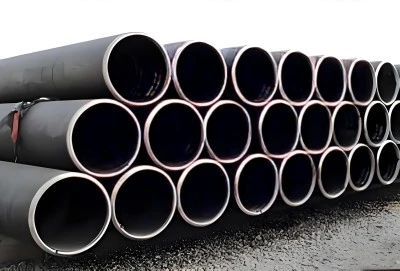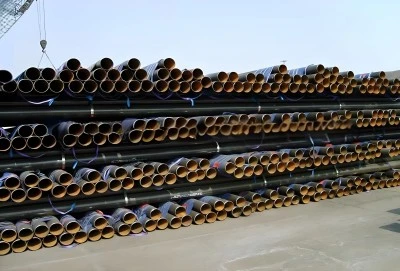In the world of oil and gas transportation, the reliability and safety of pipeline systems are paramount. At the heart of these systems lie steel line pipes, which must meet stringent quality standards to ensure the safe and efficient transportation of valuable resources. Among these standards, the API 5L X42 steel line pipe manufacturers' specification stands out as a crucial benchmark for steel line pipe manufacturers and users alike. In this comprehensive guide, we'll delve into the intricacies of API 5L X42 steel line pipes, exploring their standards, specifications, and the importance of API certification in the industry.
|
|
|
What does API 5L X42 specification cover?
The API 5L X42 specification is a part of the broader API 5L standard, which is developed and maintained by the American Petroleum Institute (API). This specification specifically covers seamless and welded steel line pipes used in pipeline transportation systems for the oil and natural gas industries. The "X42" designation refers to the minimum yield strength of the steel, which is 42,000 pounds per square inch (psi) or approximately 290 megapascals (MPa).
The API 5L X42 specification encompasses various aspects of steel line pipe production and performance, including:
- Chemical composition requirements
- Mechanical properties
- Dimensional tolerances
- Manufacturing processes
- Testing and inspection procedures
- Marking and documentation requirements
These comprehensive guidelines ensure that API 5L X42 steel line pipe manufacturers meet the necessary quality and performance standards for their intended applications. The specification covers both seamless and welded pipes, with various grades available to suit different operational requirements.
One of the key aspects of the API 5L X42 specification is the chemical composition of the steel. The standard sets limits on the content of various elements, including carbon, manganese, phosphorus, sulfur, and others. These limits are crucial in determining the pipe's strength, weldability, and resistance to various forms of corrosion and environmental factors.
Additionally, the specification outlines the mechanical properties that API 5L X42 steel line pipes must possess. These include minimum yield strength, tensile strength, and elongation requirements. These properties ensure that the pipes can withstand the pressures and stresses associated with oil and gas transportation without failure.
The dimensional tolerances specified in API 5L X42 are another critical aspect of the standard. These tolerances cover various parameters such as pipe diameter, wall thickness, length, and straightness. Adhering to these tolerances is essential for ensuring proper fit and function within pipeline systems, as well as maintaining consistent performance across different pipe sections.
Why is API certification crucial for steel line pipes?
API certification plays a vital role in the steel line pipe industry, serving as a mark of quality, reliability, and compliance with industry standards. For API 5L X42 steel line pipe manufacturers and users, obtaining and maintaining API certification is crucial for several reasons:
- Quality Assurance: API certification ensures that steel line pipes meet the rigorous quality standards set forth by the American Petroleum Institute. This certification provides assurance to buyers and end-users that the pipes they are purchasing have undergone thorough testing and inspection processes.
- Industry Recognition: API certification is widely recognized and respected within the oil and gas industry. Many project specifications and regulatory requirements mandate the use of API-certified products, making certification essential for manufacturers to compete in the global market.
- Consistency and Standardization: By adhering to API standards, manufacturers ensure that their products are compatible with industry-wide practices and equipment. This standardization facilitates easier integration of pipes from different suppliers into complex pipeline systems.
- Safety and Reliability: The stringent requirements of API certification contribute to the overall safety and reliability of pipeline systems. Certified pipes are less likely to fail under operational conditions, reducing the risk of accidents, leaks, and environmental damage.
- Regulatory Compliance: In many jurisdictions, the use of API-certified steel line pipes is mandated by regulatory bodies. Compliance with these regulations is essential for project approval and operational licenses.
- Continuous Improvement: The API certification process encourages manufacturers to continually improve their production processes and quality control measures. This ongoing commitment to excellence benefits the entire industry by driving innovation and raising overall standards.
For API 5L X42 steel line pipe manufacturers, obtaining and maintaining API certification involves a comprehensive audit of their manufacturing facilities, processes, and quality control systems. This audit ensures that the manufacturer has the capability to consistently produce pipes that meet the API 5L X42 specification.
The certification process also includes regular surveillance audits to verify ongoing compliance with API standards. These audits help maintain the integrity of the certification and ensure that manufacturers continue to meet the required quality standards over time.
How to verify compliance with API 5L standards?
Verifying compliance with API 5L standards is a critical step for anyone involved in the procurement or use of steel line pipes, including API 5L X42 steel line pipe manufacturers. Here are several methods and considerations for ensuring that pipes meet the required standards:
- Check for API Monogram: The most straightforward way to verify compliance is to look for the API Monogram on the pipe itself. This distinctive mark indicates that the manufacturer is licensed by API to produce pipes in accordance with API 5L standards. The monogram should be accompanied by the manufacturer's name, pipe size, grade, and other relevant information.
- Review Documentation: Request and carefully review the manufacturer's test reports and certificates. These documents should provide detailed information about the pipe's chemical composition, mechanical properties, and dimensional characteristics. Ensure that all reported values fall within the ranges specified by the API 5L X42 standard.
- Third-Party Inspection: Consider engaging a third-party inspection service to conduct independent verification of the pipes. These inspectors can perform various tests and measurements to confirm compliance with API 5L standards.
- On-Site Audits: For large-scale projects or ongoing supply relationships, consider conducting on-site audits of the manufacturer's facilities. This can provide firsthand insight into their production processes, quality control measures, and overall commitment to API standards.
- Material Testing: In some cases, it may be necessary to conduct additional material testing on pipe samples. This can include destructive tests to verify mechanical properties or non-destructive tests to check for defects or inconsistencies.
- Verify API Certification: Use the API Composite List, available on the API website, to confirm that the manufacturer is currently certified to produce API 5L X42 pipes. This list is regularly updated and provides real-time information on certified manufacturers.
It's important to note that compliance with API 5L standards goes beyond just meeting the specified chemical and mechanical properties. The standard also covers aspects such as pipe marking, documentation, and traceability. Ensuring compliance in these areas is equally important for the overall quality and reliability of the pipes.
For buyers and users of API 5L X42 steel line pipes, developing a comprehensive quality assurance program is essential. This program should include clear procedures for verifying compliance with API standards at various stages, from initial procurement to final installation.
By implementing these verification methods, stakeholders can ensure that the steel line pipes they use meet the high standards set by API, contributing to the safety, efficiency, and longevity of their pipeline systems.
China API 5L x42 Steel Line Pipe Manufacturers
The global demand for high-quality steel line pipes has led to the emergence of numerous manufacturers worldwide, with China playing a significant role in the market. Chinese API 5L X42 steel line pipe manufacturers have made substantial investments in technology and quality control measures to meet international standards and compete on the global stage.
When selecting an API 5L X42 steel line pipe manufacturer, it's crucial to consider factors such as production capacity, quality control processes, and certifications. One such manufacturer that stands out in the industry is LONGMA GROUP. With their long-term stable cooperation with raw material factories and mature, complete production supporting facilities, LONGMA GROUP has established itself as a reliable supplier of API 5L X42 steel line pipes.
LONGMA GROUP's commitment to quality is evidenced by their comprehensive range of certifications, including:
- API 5L Certificate
- ISO Certificate
- QMS Certificate
These certifications demonstrate LONGMA GROUP's adherence to international quality standards and their dedication to producing steel line pipes that meet the stringent requirements of the oil and gas industry.
If you are in the process of selecting an API 5L X42 steel line pipe manufacturer for your project, consider reaching out to LONGMA GROUP. Their expertise in producing high-quality steel line pipes, combined with their commitment to customer satisfaction, makes them a strong contender in the market. For more information or to discuss your specific requirements, you can contact LONGMA GROUP at info@longma-group.com.














